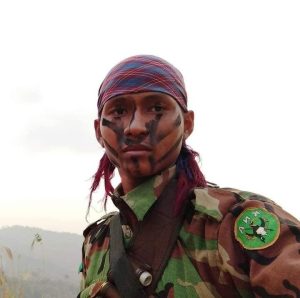On April 3 and 4, three branches of two banks were attacked and looted by militants of the Kuki-Chin National Front (KNF), an outlawed separatist organization based in the Chittagong Hill Tracks (CHT) in Bangladesh. In addition, a bank manager was abducted and security officials were attacked.
Soon after security officials carried out a coordinated operation against the KNF in Bandarban, and not only rescued the bank manager but also arrested Cheusim Bawm, one of the chief coordinators of the KNF central committee.
Set up in 2017 by Nathan Bom, a fine arts graduate from the University of Dhaka, the KNF was established to create an independent sovereign state for the Bawm people, comprising nine upazilas (subdistricts) within the Rangamati and Bandarban districts. The KNF is said to have around 2,000 members from six subgroups of the Kuki-Chin ethnic group – the Bom, Pangkhua, Lusai, Khumi, Mro, and Khiang.
Bom was previously affiliated with the Pahari Chhatra Parishad (PCP), which is the student branch of the Parbatya Chattagram Jana Samhati Samiti (PCJSS).
KNF members belong to the Kuki Chin, a conglomeration of various ethnic groups primarily residing in the Sylhet and Chittagong Hill Tracts regions of Bangladesh, the northeastern states of India, and the Chin state of Myanmar. These communities speak Tibeto-Burman languages and are referred to by various names in these regions. In India’s Manipur and Mizoram states, they are referred to as Kuki and Mizo, respectively, while in Myanmar they are known as Chin.
The KNF rose to prominence in May 2023 following an alleged execution of two Bangladesh Army soldiers in Bandarban that security officials blamed on the KNF. They revealed that the KNF had offered combat training and taught operational strategies to Jama’atul Ansar Fil Hindal Sharqiya members at KNF training camps in the CHT in October 2022.
According to officials of the Rapid Action Battalion (RAB), an anti-terrorism unit of the Bangladesh Police, the KNF’s strategy is aimed at securing autonomy for the Kuki-Chin people along the Myanmar-Bangladesh border through armed struggle. They were prepared to attack important installations and individuals if required. To achieve their objectives, the group enlisted young males from a minimum of 19 districts, transported them to the mountains, and put them through intense combat training.
Soon after their involvement with Jama’atul Ansar Fil Hindal Sharqiya, Bangladeshi law enforcement agencies initiated a series of military operations and some 20 KNF members were apprehended along with firearms. In the remote districts of Rangamati, Khagrachari, and Bandarban, the KNF had emerged as a new source of concern.
Following the recent violent attacks on banks and law enforcement agency members, a Peace Establishment Committee was formed to foster dialogue and reconciliation between the government and the KNF. Two rounds of direct talks took place on November 5, 2023, and March 5, 2024, which led to the signing of two memorandums of understanding relating to KNF’s cessation of armed activities in the hill tracts. However, the KNF has continued to engage in armed activities in violation of the MoUs.
The KNF says that it has turned to armed struggle as the benefits of the Chittagong Hill Tracts Peace Accord signed between the Bangladeshi government and the M.N. Larma-led PCJSS in December 1996 primarily resulted in the development of facilities and opportunities in the Rangamati and Khagrachhari districts of the CHT and the Chakma and Marma communities. The Kuki-Chin have not benefited at all and remain a deprived community it says.
The Kuki-Chin express deep concern over the alleged persecution and discrimination by the Jana Samhati Samity (JSS) and the coordinated attacks by the Arakan Army. In this regard, the KNF president said: “We take immense pride in being citizens of this country, but at the same time, we also rue the indisputable fact that we have been treated as second-class citizens in our own land and country, and deprived of all the benefits of development which being a citizenry of a republic country like ours entails,”
The KNF’s violent activities pose a threat to the Bangladeshi state. However, the implications of this militant group are not restricted to the borders of Bangladesh, as the Kuki-Chin are part of militant groups operating in India’s Northeast and Myanmar as well. The National Defense Force (NDF), which comprises people of Kuki-Chin ethnicity, is a militant group that is active in Myanmar’s Chin state and has a long history of resisting Myanmar’s central authorities. A large number of Kukis have migrated from the Chin state to India’s Mizoram state. Meanwhile, the Kukis in India’s Manipur are locked in serious conflict with the Meitei.
The militancy of the Kuki-Chin has not only inflamed the region but also fueled arms and drug trafficking. There are close links between the KNF and other militant organizations. Given the ramifications the rise of the KNF has for regional security and stability, Bangladesh, India and Myanmar must collaborate to act against the group.

































